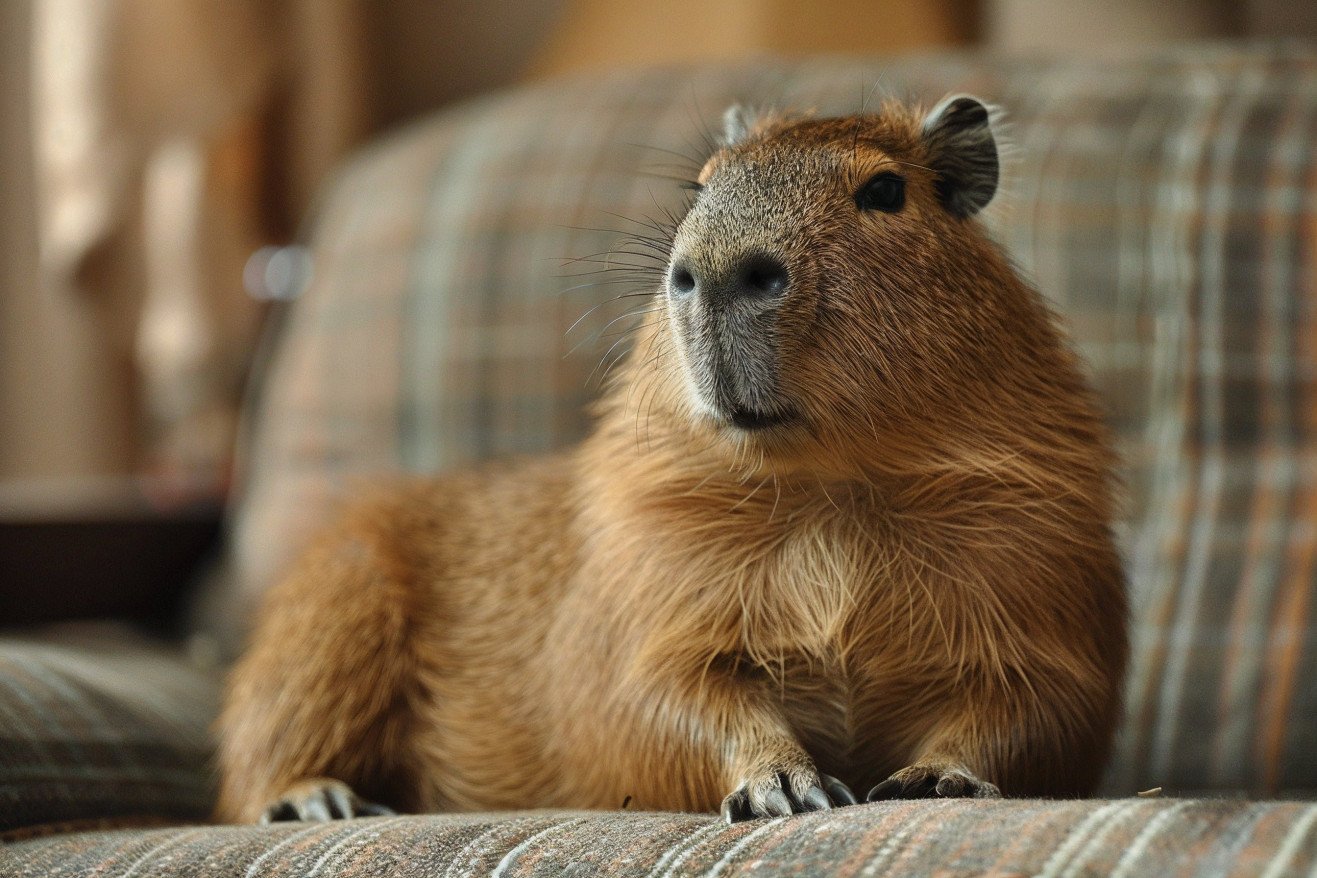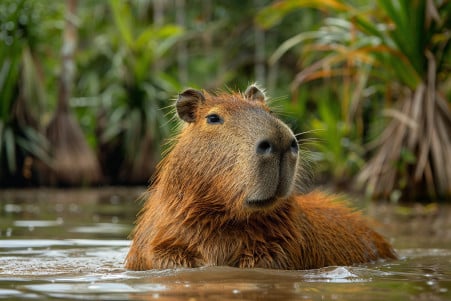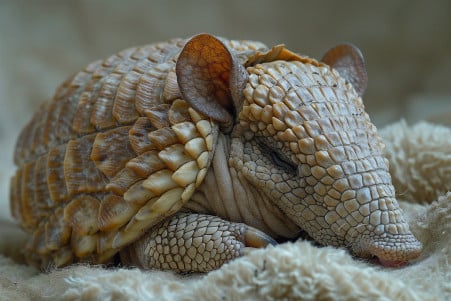Can You Have a Capybara as a Pet? What You Need to Know
25 May 2024 • Updated 24 May 2024

With capybaras becoming increasingly popular as an unusual exotic pet, many potential pet owners want to know more about the ins and outs of owning one of these large semi-aquatic rodents. While it is legal to own one of these social, dog-sized creatures in many places, it takes a lot of time and effort to meet their extensive space requirements for both living and swimming space, which is why capybaras are best left as backyard squirrels for serious exotic pet enthusiasts.
We will explore the latest research found in care manuals, veterinary literature, and personal anecdotes that will help you understand what it takes to care for a capybara as a pet. From their need for special housing and diets to how to manage their social needs, this article will give you the information you need to determine if you can provide the right home for these unique animals.
Can you have a capybara as a pet?
The Capybara's Natural Habitat
Capybaras are semi-aquatic animals native to South and Central America, where they live in densely forested areas near bodies of water such as lakes, rivers, swamps, ponds, and marshes and flooded savannas. They are excellent swimmers that can hold their breath for up to five minutes, so they spend a lot of time in the water to escape predators, cool off, and eat aquatic plants.
The world's largest rodents, capybaras are herbivores that eat grasses, aquatic plants, fruits, and tree bark. They are picky eaters and may even switch to reeds during the dry season when their usual food sources are scarce. In the wild, capybaras are social animals that live in family groups of about 10-30 individuals, although they may form larger groups of up to 100 when water is hard to find during the dry season.
Although capybaras can live in a variety of habitats, from wetlands to grasslands, their ideal environment is the lush Amazon rainforest. The rainforest's year-round growing season provides plenty of food and water for the animals, who are semi-aquatic. It's difficult to recreate the conditions of the rainforest in captivity, so capybaras aren't suitable as pets for most people, despite their cuteness. Their housing, dietary, and social needs are too specialized.
Legalities and Licensing of Capybara Ownership
The legality of keeping a capybara as a pet is highly dependent on the state, county, city, and even neighborhood in the United States. According to capybaraworld, some states such as Texas, Arizona, and Florida are generally more accepting of capybara ownership if the proper licenses and permits are obtained. On the other hand, some states like Alaska, California, Colorado, and Connecticut have outright bans on keeping capybaras as pets.
Even in states where capybara ownership is allowed, there are often stringent requirements and regulations that must be met. For example, as outlined by GeeksforGeeks, it’s important to make sure that you have the right licenses and permits because owning a capybara illegally can lead to fines and the animal being taken away. WorldPopulationReview explains that licensing is often done through the state’s Fish and Wildlife department, and in some cases, the state has third-party processors that issue permits for the possession of exotic animals.
Because of the legal hurdles and risks, it’s important to make sure that you research and understand the laws in your area before you even consider getting a capybara as a pet. If you don’t, you could face some serious consequences for yourself and the animal.
Housing and Environmental Requirements for Pet Capybaras
Capybaras need a large outdoor pen with both sunny and shaded areas so they can control their body temperature, says How to Care for a Pet Capybara. They also need a deep pool or pond that's at least 3.5 feet deep so they can wade, swim, and cool off. In addition, they need a shelter with hay and a heat lamp for when the weather is cold, according to Capybara: Are They Good Pets?.
The pen should also include lots of plants for the capybaras to eat and things to chew on to keep their teeth healthy, says How to Care for a Pet Capybara. In fact, creating a semi-aquatic environment is important for the capybara's physical and mental health in captivity, according to A Pet Capybara Should I Have One?.
Dietary and Nutritional Information for Pet Capybaras
Capybaras are herbivores, so their dietary needs in captivity are very specific. The San Diego Zoo explains that their diet should be made up of fresh greens, hay, vegetables, and some fruit. Capybaras also need to have access to fresh, clean water at all times and swimming pools to help them digest their food, as well as maintain their skin health, which can dry out and crack without water.
It's also important to make sure that capybaras have access to chew toys and other items to help them keep their teeth healthy and satisfy their natural behaviors, according to AZPetVet. It's also a good idea to work with an exotic animal vet to ensure that capybaras are getting the right nutrition and supplements, since their nutritional needs may not be met by a standard herbivore diet.
Behavioral and Social Considerations of Pet Capybaras
Capybaras are social creatures and should be kept in pairs or groups in captivity, according to AZPetVet. If they are kept alone or not properly socialized, they can become aggressive, territorial, and frustrated, according to WebMD. They may even consider their human owners part of their social group, which can lead to nipping or biting.
As capybaraworld notes, capybaras require training and handling to manage their behavior and set limits. Their intelligence and sensitivity also mean they require enrichment to keep them from getting bored and stressed. If their social needs are not met, they may become aggressive or destructive, which can be dangerous for both the animal and its owners.
Potential Dangers and Pitfalls of Capybara Ownership
Capybaras' powerful jaws and sharp teeth can accidentally hurt their owners during roughhousing or when being handled, as AZPetVet points out. Their large size and strength are also potential hazards, with adult capybaras weighing in at over 100 pounds, according to WebMD. In addition, providing proper medical care for these exotic pets can be challenging and costly, as capybaraworld explains.
Capybaras are also known to suffer from stress, separation anxiety, and other behavioral problems when kept as pets, according to capybaraworld. As a result, potential owners need to be ready to make a long-term, potentially 10-15 year commitment to caring for a capybara, which will require a significant investment of time, money, and energy. While they may be tempting to take home, these issues make it clear that capybaras are not the best choice for most people looking for a pet.
Conclusion: Is a Capybara the Right Pet for You?
Capybaras are a big investment in terms of space, money, and time. Their semi-aquatic lifestyle and social nature mean that they have specific needs that can be hard to meet in a home environment. And while they are generally friendly, they are still wild animals that can be dangerous and have special needs that the average pet owner can't meet.
Before deciding if a capybara is the right pet for you, make sure you look into local laws, costs, and long-term commitments. For most people, however, it's probably best to enjoy these amazing creatures at a zoo or sanctuary that can provide them with the care and environment they need to thrive.


